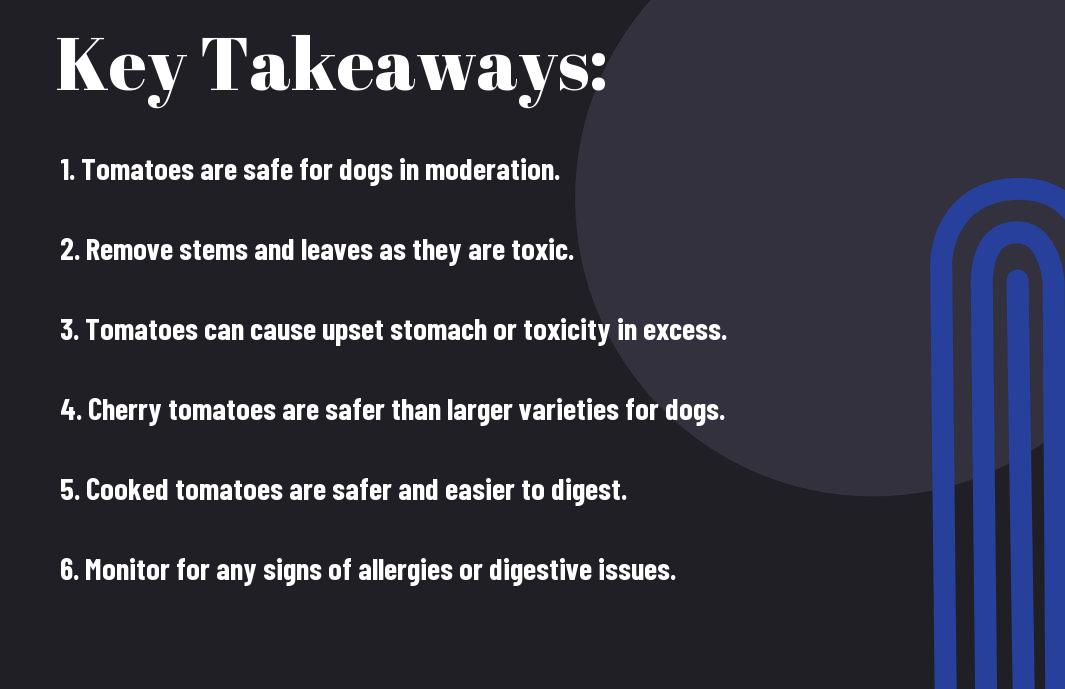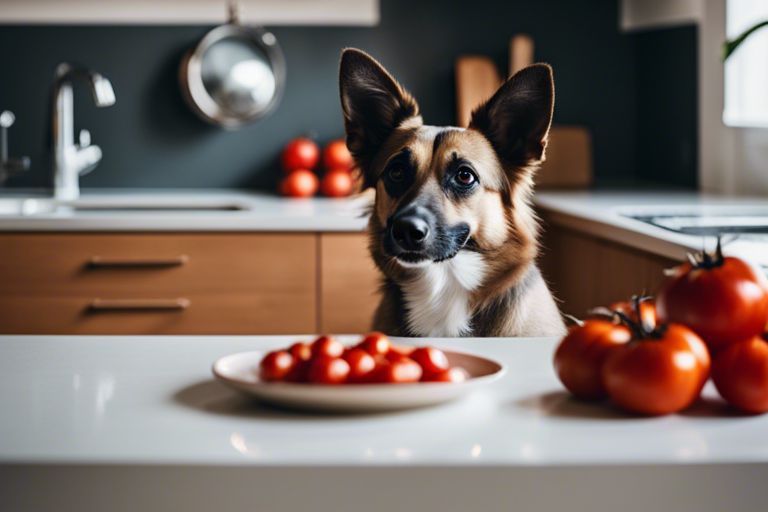Just like with many other human foods, you may be wondering if it’s safe to share your love for tomatoes with your furry friend. In this informative guide, we will explore whether raw tomatoes are a suitable treat for your dog, taking into consideration their health and well-being. Let’s dig into the facts to help you make the best decision for your canine companion.
Key Takeaways:
- Tomatoes are safe for dogs in moderation: Raw tomatoes are generally safe for dogs to eat, but only in small quantities.
- Avoid green parts of the tomato plant: The stems and leaves of tomato plants contain toxins that can be harmful to dogs, so it’s important to only feed them the ripe fruit.
- Monitor your dog for any adverse reactions: While some dogs may enjoy the occasional raw tomato as a treat, others may have sensitivities or allergies, so always observe your pet for any negative reactions.
The Tomato Conundrum
The Myth Behind Raw Tomatoes
On your quest to understand what your furry friend can safely consume, you may have stumbled upon the age-old question: Can dogs eat tomatoes? According to Can Dogs Eat Tomatoes? Read Before You Feed, raw tomatoes can be a source of concern for dog owners due to the presence of a substance called solanine, which can be toxic in large quantities. This has given rise to the myth that all parts of the tomato plant, including the fruit itself, are harmful to dogs.
Separating Fact from Fiction
Fiction: But before you ban tomatoes from your dog’s diet entirely, it’s vital to separate fact from fiction. The truth is, while the leaves and stems of tomato plants are indeed toxic to dogs, the ripe fruit of the tomato itself is generally considered safe in small amounts. In fact, tomatoes are packed with vital nutrients like vitamins A and C, making them a healthy treat option for your canine companion.
The idea that all forms of tomatoes are harmful to dogs is a common misconception. The reality is that while some parts of the tomato plant can be harmful, the ripe fruit can be a safe and nutritious addition to your dog’s diet when given in moderation.
Nutritional Value of Tomatoes
You may be surprised to learn that tomatoes are packed with vital vitamins and minerals that can be beneficial for your dog’s health. In addition, they contain high levels of antioxidants, such as lycopene, which can have a positive impact on your furry friend’s well-being.
Vitamins and Minerals in Tomatoes
An vital aspect of your dog’s diet is ensuring they receive an adequate amount of vitamins and minerals. Tomatoes are a good source of vitamin C, potassium, and folate, which are all important for your dog’s overall health. Vitamin C helps boost their immune system, potassium supports proper nerve and muscle function, and folate is crucial for cell growth and metabolism.
The Role of Lycopene in Canine Health
Tomatoes contain a significant amount of lycopene, a powerful antioxidant known for its potential health benefits. Lycopene has been linked to reducing the risk of certain chronic diseases, including heart disease and cancer. In addition, it can help improve your dog’s skin and coat health, making their fur shiny and their skin healthy.
Another important benefit of lycopene for dogs is its potential role in reducing inflammation. Inflammation is a common issue in dogs, especially as they age, and lycopene’s anti-inflammatory properties can help alleviate symptoms and improve your dog’s overall well-being.
The Risks of Feeding Raw Tomatoes to Dogs
Solanine Toxicity
With raw tomatoes, there is a risk of solanine toxicity, as tomatoes are part of the nightshade family of plants. While the leaves and stems of the tomato plant contain the highest levels of solanine, the unripe green tomatoes also have notable amounts of this toxic compound. Ingesting solanine can lead to symptoms such as gastrointestinal issues, lethargy, and even more severe effects in some cases.
Gastrointestinal Upset
Tomatoes contain high levels of acidity, which can be harsh on your dog’s digestive system when consumed in large quantities. This acidity can lead to gastrointestinal upset, causing symptoms like stomach pain, vomiting, and diarrhea. If your dog has a sensitive stomach, feeding them raw tomatoes may exacerbate these issues.
It’s crucial to introduce new foods to your dog’s diet gradually to monitor how they react. If you notice any signs of gastrointestinal upset after feeding them raw tomatoes, it’s best to avoid giving them this food in the future to prevent further discomfort.
Choking Hazards
Risks of choking exist when feeding whole raw tomatoes to your dog, especially if they are not properly chewed. The round shape and slippery texture of tomatoes can pose a choking hazard, particularly for small dogs or those who tend to gulp their food quickly. In some instances, dogs may try to swallow a tomato whole, leading to an obstruction in their airway.
This highlights the importance of cutting up tomatoes into small, manageable pieces before sharing them with your furry friend. By doing so, you can help reduce the risk of choking and ensure your dog can safely enjoy tomatoes as an occasional treat.
Cooking Tomatoes: A Safer Option?
Once again, when it comes to feeding your furry friend tomatoes, cooking them might be a safer option. Cooking tomatoes can help break down harmful substances like solanine that can be harmful to dogs.
Breaking Down Solanine
Cooking tomatoes can help break down solanine, a toxin found in the stems and leaves of tomato plants. While the levels of solanine in ripe tomatoes are generally low and not harmful to humans, they can still pose a risk to your dog. By cooking tomatoes, you can reduce the risk of your dog ingesting solanine and experiencing any adverse effects.
Enhancing Nutrient Absorption
When you cook tomatoes, you not only break down harmful substances like solanine but also enhance the absorption of nutrients. Cooking tomatoes helps release lycopene, an antioxidant that has been linked to various health benefits. By cooking tomatoes, you make it easier for your dog to absorb these beneficial nutrients.
Additionally, cooking tomatoes can make them easier for your dog to digest, reducing the risk of gastrointestinal upset. This can be particularly helpful for dogs with sensitive stomachs or digestive issues.
Solanine
Solanine is a glycoalkaloid poison found in various plants, including tomatoes. While ripe tomatoes generally have low levels of solanine and are safe for dogs to consume in moderation, the leaves and stems of tomato plants contain higher concentrations of this toxin. Cooking tomatoes can help break down solanine and reduce the risk of your dog ingesting harmful amounts of this toxin.
Can Dogs Eat Cherry Tomatoes or Grape Tomatoes?
Keep in mind that cherry tomatoes and grape tomatoes are still tomatoes, just smaller in size. While they may be adorable bite-sized treats to you, they can also pose similar risks to your furry friend as regular-sized tomatoes. The outer casing of cherry and grape tomatoes contains solanine, which can be harmful to dogs if ingested in large amounts.
Size Matters
Any tomato, regardless of its size, can be a choking hazard for your dog. Small cherry tomatoes or grape tomatoes may seem harmless, but if your pup swallows them whole, it can lead to a blockage in their throat or digestive system. To prevent any accidents, it’s best to cut cherry and grape tomatoes into smaller, more manageable pieces before giving them to your dog.
Skin and Seeds: A Concern?
With cherry tomatoes and grape tomatoes, the skin and seeds make up a higher percentage of the overall fruit compared to larger tomatoes. While tomato plants are part of the nightshade family and can be toxic to dogs, the levels of toxicity are lower in the fruit itself. However, the skin and seeds still contain solanine and tomatine, which can be harmful if consumed in large quantities.
Skin and seeds of cherry tomatoes and grape tomatoes can be difficult for your dog to digest, potentially leading to gastrointestinal upset. While a small nibble here and there may not cause any issues, it’s necessary to monitor your dog for any signs of discomfort or illness after consuming these tiny tomatoes.
Alternatives to Tomatoes for Your Dog’s Diet
Not all dogs may enjoy or be able to digest raw tomatoes, so it’s imperative to explore alternative fruits and vegetables that can be a healthy addition to your furry friend’s diet. Here are some alternatives to tomatoes that you can consider incorporating into your dog’s meals.
Healthy Fruits and Vegetables for Dogs
Your dog can benefit from a variety of fruits and vegetables that are safe and nutritious for them. Carrots, sweet potatoes, blueberries, and green beans are excellent options that can provide imperative vitamins, minerals, and antioxidants without the potential risks associated with tomatoes. These alternatives can add a tasty and healthy variety to your dog’s diet while keeping them satisfied and nourished.
Supplements for a Balanced Diet
Any dog owner should ensure their pet is receiving a balanced diet that meets their nutritional needs. In addition to fruits and vegetables, supplements can be a valuable addition to your dog’s diet to fill any nutritional gaps. Omega-3 fatty acids, probiotics, and multivitamins are examples of supplements that can support your dog’s overall health and well-being.
Understanding the specific dietary requirements of your dog and consulting with a veterinarian can help you determine the most suitable supplements to add to their diet. By providing a balanced combination of food, fruits, vegetables, and supplements, you can ensure that your canine companion remains healthy and happy.
To wrap up
Upon reflecting on the question “Can my dog eat raw tomatoes?” it’s important to consider the potential risks and benefits. While tomatoes in small amounts can be safe for some dogs, there are risks of digestive upset and potential toxicity in certain parts of the tomato plant. It’s crucial to consult your veterinarian before introducing any new food into your dog’s diet to ensure their safety and well-being. Remember to always feed your furry friend a balanced and appropriate diet to keep them healthy and happy.
FAQ
Q: Can my dog eat raw tomatoes?
A: No, dogs should not eat raw tomatoes as they contain solanine, a toxic substance that can be harmful to dogs if consumed in large quantities.
Q: Are cooked tomatoes safe for dogs to eat?
A: Cooked tomatoes are generally safe for dogs to consume in moderation, as the cooking process helps to break down the harmful toxins present in raw tomatoes.
Q: What are the potential risks of feeding raw tomatoes to my dog?
A: Feeding raw tomatoes to your dog can lead to symptoms such as gastrointestinal upset, weakness, and confusion due to the presence of solanine in the fruit.
Q: Are there any health benefits for dogs from eating tomatoes?
A: Tomatoes contain vitamins A and C, as well as lycopene, which can have some health benefits for dogs when consumed in small amounts. However, it is important to consult with your veterinarian before adding tomatoes to your dog’s diet.
Q: How should I safely incorporate tomatoes into my dog’s diet?
A: If you want to feed your dog tomatoes, make sure they are cooked and only offer them in small quantities as an occasional treat. Always remove the stems and leaves, as these parts of the tomato are toxic to dogs.
The Top Dog Breeds Recognized by the American Kennel Club
Dog Training 101: Train Your Pup




